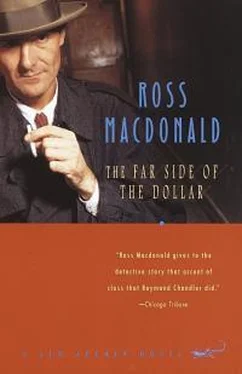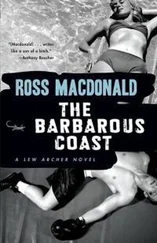He looked around at the place as if it had betrayed him a second time.
“If you’re telling the truth about the date, you didn’t take the picture I’m interested in. It was taken in April.”
“I’m not lying. By that time Otto Sipe had another boy.”
“What gave him so much power around the hotel?”
“I think he had something on the management. He hushed up something for them, long ago, something about a movie star who stayed here.”
“Was Mike staying here at the time he was picked up?”
“Yeah. I let him and Carol use my room, the one that went with the job. I slept in the employees’ dormitory. I think Otto Sipe let Carol stay on in the room for a while after me and Mike were arrested.”
“Was it the room next door to his, at the end of the corridor?”
“Yeah.”
“Did it have a brass bed in it?”
“Yeah. Why?”
“I was just wondering. They haven’t changed the furnishings since the war. That interconnecting bathroom would have been handy for Sipe, if he liked Carol.”
He shook his head. “Not him. He had no use for women. And Carol had no use for him. She got out of there as soon as she could make other arrangements. She went to live with a woman friend in Burbank.”
“Susanna.”
Harold blinked. “Yeah. That was her name, Susanna. I never met her, but she must have been a nice person.”
“What kind of a girl was Carol?”
“Carol? She was a beauty. When a girl has her looks, you don’t think much about going deeper. I mean, there she was. I always thought she was an innocent young girl. But Lila says you could fill a book with what I don’t know about women.”
I looked at my watch. It was past eight, and Harold had probably taken me as far as he could. Partly to make sure of this, I asked him to come across the highway and see his old acquaintance, Ben Daly. He didn’t hang back.
Daly scowled at us from the doorway of his lighted office. Then he recognized Harold, and his brow cleared. He came out and shook hands with him, disregarding me.
“Long time no see, Har.”
“You can say that again.”
They talked to each other across a distance of years, with some warmth and without embarrassment. There was no sign of guilty involvement between them. It didn’t follow necessarily, but I pretty well gave up on the idea that either of them was involved in any way with the recent crimes.
I broke in on their conversation: “Will you give me one minute, Ben? You may be able to help me solve that murder.”
“How? By killing somebody else?”
“By making another identification, if you can.”
I brought out Dick Leandro’s picture and forced it into his hand. “Have you ever seen this man?”
He studied the picture for a minute. His hand was unsteady. “I may have. I’m not sure.”
“When?”
“Last night. He may be the one who came to the hotel last night.”
“The one with the girl, in the new blue Chevvy?”
“Yeah. He could be the one. But I wouldn’t want to swear to it in court.”
THE SANTA MONICA bus station is on a side street off lower Wilshire. At a quarter to nine I left my car at the curb and went in. Stella, that incredible child, was there. She was sitting at the lunch counter at the rear in a position from which she could watch all the doors.
She saw me, of course, and swung around to hide her face in a cup of coffee. I sat beside her. She put down her cup with an impatient rap. The coffee in it looked cold, and had a grayish film on it.
She spoke without looking directly at me, like somebody in a spy movie. “Go away. You’ll frighten Tommy off”
“He doesn’t know me.”
“But I’m supposed to be alone. Besides, you look like a policeman or something.”
“Why is Tommy allergic to policemen?”
“You would be, too, if they locked you up the way they locked him up.”
“If you keep running away, they’ll be locking you up, Stella.”
“They’re not going to get the chance,” she said, with a sharp sideways glance at me. “My father took me to a psychiatrist today, to see if I needed to be sent to Laguna Perdida. I told her everything, just as I’ve told you. She said there was nothing the matter with me at all. So when my father went in to talk to her I walked out the front door and took a taxi to the bus station, and there was a bus just leaving.”
“I’m going to have to drive you home again.”
She said in a very young voice: “Don’t teenagers have any rights?”
“Yes, including the right to adult protection.”
“I won’t go without Tommy!”
Her voice rose and broke on his name. Half the people in the small station were looking at us. The woman behind the lunch counter came over to Stella.
“Is he bothering you, miss?”
She shook her head. “He’s a very good friend.”
This only deepened the woman’s suspicions, but it silenced her. I ordered a cup of coffee. When she went to draw it, I said to Stella: “I won’t go without Tommy, either. What did your psychiatrist friend think about him, by the way?”
“She didn’t tell me. Why?”
“I was just wondering.”
The waitress brought my coffee. I carried it to the far end of the counter and drank it slowly. It was eight minutes to nine. People were lining up at the loading door, which meant that a bus was expected.
I went out the front, and almost walked into Tommy. He had on slacks and a dirty white shirt. His face was a dirty white, except where a fuzz of beard showed.
“Excuse me, sir,” he said, and stepped around me.
I didn’t want to let him get inside, where taking him would create a public scene that would bring in the police. I needed a chance to talk to him before anyone else did. There wasn’t much use in trying to persuade him to come with me. He was lean and quick and could certainly outrun me.
These thoughts went through my head in the second before he reached the door of the station. I put both arms around his waist from behind, lifted him off his feet, and carried him wildly struggling to my car. I pushed him into the front seat and got in beside him. Other cars were going by in the road, but nobody stopped to ask me any questions. They never do any more.
Tom let out a single dry sob or whimper, high in his nose. He must have known that this was the end of running.
“My name is Lew Archer,” I said. “I’m a private detective employed by your father.”
“He isn’t my father.”
“An adoptive father is a father, too.”
“Not to me he isn’t. I don’t want any part of Captain Hillman,” he said with the cold distance of injured youth. “Or you either.”
I noticed a cut on the knuckle of his right hand. It had been bleeding. He put the knuckle in his mouth and sucked it, looking at me over it. It was hard to take him seriously at that moment. But he was a very serious young man.
“I’m not going back to my cruddy so-called parents.”
“You have nobody else.”
“I have myself.”
“You haven’t been handling yourself too well.”
“Another lecture.”
“I’m pointing out a fact. If you could look after yourself decently, you might make out a case for independence. But you’ve been rampaging around clobbering middle-aged doctors–”
“He tried to make me go home.”
“You’re going home. The alternative seems to be a life with bums and criminals.”
“You’re talking about my parents, my real parents.”
He spoke with conscious drama, but there was also a kind of bitter awe in his voice. “My mother wasn’t a bum and she wasn’t a criminal. She was– nice.”
“I didn’t mean her.”
Читать дальше












